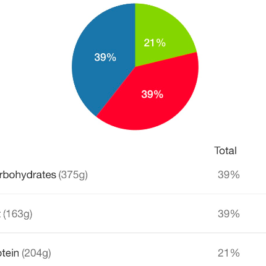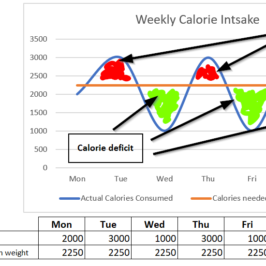- How Much Weight Can You Realistically Lose in 3 Months? - January 14, 2024
- How To Lose 1kg a Week (Guaranteed) - August 20, 2023
- How To Count Calories (or Estimate) and Stay on Track When Eating Out at Restaurants - July 25, 2023
What Is Calorie Balance?
Calorie balance is the difference between the number of calories you eat and the number of calories you burn over a given time period. A positive calorie balance (eating more calories than you burn) will result in weight gain, the opposite; a negative calorie balance (burning more calories than you eat) will result in weight loss.
James Smith has helped to push the calorie balance message to a much wider audience than were originally aware of it as a fundamental principle for sustainable weight loss.
His slogan ‘calorie fucking deficit’ has permeated the mass media (he’s been on actual TV) which is a real step in the right direction; I reckon he’s started to reverse some of the misinformation around nutrition and fitness spread by Joe Wicks over the last couple of years with his ridiculously high-calorie recipes and misleading ‘eat more, move less’ message.
The problem is, many of James Smith’s devout fans will blindly regurgitate ‘calorie fucking deficit’ without knowing what it actually means or being aware of all the moving parts behind the law of thermodynamics.
How to Implement a Calorie Deficit – In Theory
It’s one thing knowing that calorie balance is a thing, but it’s quite another knowing how to implement it for yourself or for a client. It’s not simply a case of plugging your stats into a BMR calculator, sticking religiously to the number it spits out then putting your feet up and waiting for the shreds to emerge.
Implementing a calorie deficit is an ongoing process that requires patience, consistent monitoring, and regular reassessment to ensure that the amount of calories you’re eating and the amount of exercise you’re doing is giving you the result you want, i.e. fat loss.
The only way you’ll be able to validate that you are in a calorie deficit is with consistent weigh ins. The only way you can assess what’s driving that weight loss (or lack of it) is by tracking your calorie intake (e.g. with My Fitness Pal) and calorie output (e.g with a FitBit).
Once you have this data it’s easy to make adjustments on-the-fly, rather than just eating less (or what you think is less) or doing more cardio and hoping for the best.
For example, if you’re eating 2000 calories every day, but your weight has stayed the same for several weeks, you’ll know you need to either reduce the calories you’re eating or increase the amount of activity you’re doing to elicit weight loss.
If you want a quick calorie calculator that allows you to get a rough estimate of the calories you need to eta to hot your goal weight, here you go;
How To Predict Weight Loss
One Kg of fat contains 7700 calories, so if you want to burn a Kg of fat, you need to create a 7700 calorie deficit.
Let’s say you want to lose that Kg of fat in two weeks.
7700 calories/14 days = 550 calories per day.
That means if you’re burning 3000 calories per day, and you eat 2450 calories everyday for 14 days, you lose 1 Kg of fat. IN THEORY.
While this is irrefutable science, it doesn’t always necessarily work out like that in the real world; probably for two reasons;
- Calorie counting isn’t totally accurate
- Calories burned in FitBit or other apps isn’t totally accurate
My Experiment
I tracked my calories continuously from Jan 2016 until around September 2018. I started purely because I’m a nutrition geek and I wanted to know how much I was eating calorie-wise, and to see if I could use that data to manipulate my body composition (spoiler alert: I could).
During this time I was also tracking my weight on pretty much a daily basis (Still am) and I was tracking my activity, i.e. steps and calories burned with my FitBit in the background (Also still am).
At the time, tracking my calories, activity and weight pretty much daily helped me drop fat.
Looking back at the numbers however, things really don’t add up.
I decided to analyse data over a 4 month period – 1st May 2016 to 30th September 2016 – to see how accurate calorie and activity tracking actually is.
During that time, I went from 84.1kg on May 1st to 81kg on September 30th, a 3.1kg loss.
As you can see there were some pretty huge fluctuations in there (I was almost at 86kg at one point), but this is normal; weight will always fluctuate wildly depending on how hydrated you are, how much food you ate the night before (i.e. food still in your gut) and a few other factors.
A 3.1kg loss in 4 months must have meant that I created a 23,870 calorie deficit within that time.
However, if you look at the total calories I burned (according to Fitbit) and the total calories I ate (according to my own tracking with My Fitness Pal) in that period, it actually works out as a deficit of 60,115; almost triple what it should have been.
This means that Fit Bit was likely OVERESTIMATING the amount of calories I burned, and I was UNDERESTIMATING the amount of calories I ate.
N.B. On some days I didn’t bother to track at all, so to eliminate anomalies that would have distorted the total deficit figure, even more, I took the average of the previous days intake and used that to fill in the blanks.
There were also clearly days when I only tracked one meal, probably because I just couldn’t be bothered.
I clearly couldn’t be arsed on the 7th of August.
Days like these will also be artificially inflating that overall calorie deficit number.
Despite all that, the gradual decrease in calories still correlates with a decrease in weight
This graph is a bit chaotic, as you can see there were a fair few days when the calorie intake took a sharp drop, as mentioned these days probably don’t reflect reality, but rather just highlight days where I got lazy with tracking.
The key point here however is that the trends (the straight lines are trendlines) match up pretty well, as calories come down, so does weight. Calories burned stay fairly consistent throughout but does tend to drop off gradually throughout the 4 month period. This is probably because I subconsciously reduced my activity levels in line with the reduced amount of calories I was taking in AND because my lower weight meant my metabolism decreased slightly (I’m pretty sure Fit Bit takes this into account when calculating your BMR).
A slightly more succinct way to look at the data is weight vs energy balance (basically a combination of the two metrics in the graph above).
This correlation is even cleaner, and while the total volume of the calorie balance may be inaccurate, what does match up with my weight is the trend; this is the most important thing.
This is a slightly different way of looking at the data, I’ve arranged the calories out cumulatively, so you can see exactly how much of a negative (or positive) calorie balance I was in over the period.
Each one of these graphs demonstrates a clear and obvious correlation between weight and calorie balance.
Summary
A common argument for not tracking calories and activity is that the methods used for tracking aren’t accurate, and this data proves that.
That’s party down to my own laziness, and partly down to the fact that food labels probably aren’t that accurate, and activity trackers aren’t that good at tracking the amount of calories you burn.
Even with my non-compete days accounted for (it looks like I didn’t fully track on around 9 days out of 155), it’s likely that the total calorie deficit number wouldn’t be what it ‘should’ which pretty much confirms that calorie tracking isn’t accurate.
Does that mean you shouldn’t do it? Absolutely not.
So, does calorie counting work if the goal is weight loss? Even if the calories in and calories out figures are out, who cares? Your goal isn’t to try and validate a scientific fact (i.e. 7700kcal = 1kg of fat), it’s to lose weight, and tracking your calorie intake, calorie output and weight on a daily basis will help you achieve that.







Leave a Reply